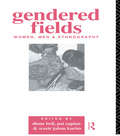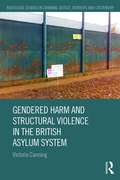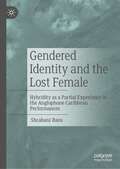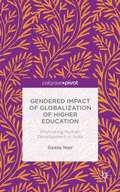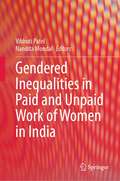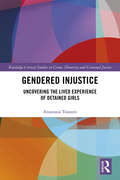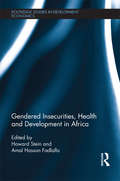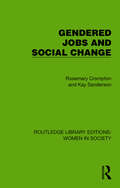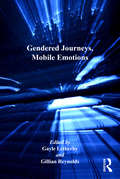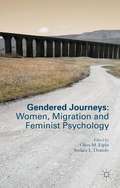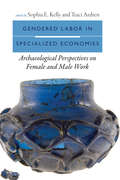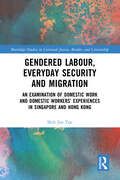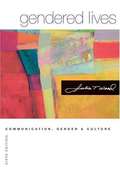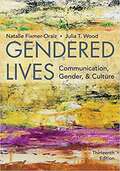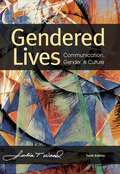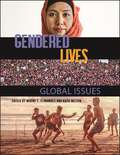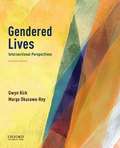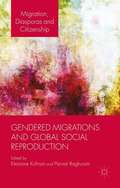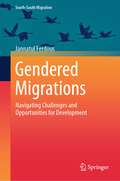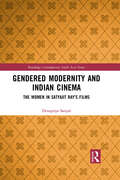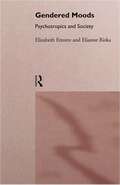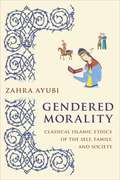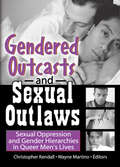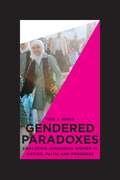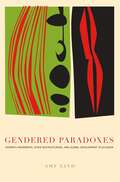- Table View
- List View
Gendered Fields: Women, Men and Ethnography
by Diane Bell Pat Caplan Wazir Jahan KarimVirtually all anthropologists undertaking fieldwork experience emotional difficulties in relating their own personal culture to the field culture. The issue of gender arises because ethnographers do fieldwork by establishing relationships, and this is done as a person of a particular age, sexual orientation, belief, educational background, ethnic identity and class. In particular it is done as men and women. Gendered Fields examines and explores the progress of feminist anthropology, the gendered nature of fieldwork itself, and the articulation of gender with other aspects of the self of the ethnographer.
Gendered Harm and Structural Violence in the British Asylum System: Harm And Structural Violence In The British Asylum System (Routledge Studies in Criminal Justice, Borders and Citizenship)
by Victoria CanningWinner of the 2018 British Society of Criminology Book Prize Britain is often heralded as a country in which the rights and welfare of survivors of conflict and persecution are well embedded, and where the standard of living conditions for those seeking asylum is relatively high. Drawing on a decade of activism and research in the North West of England, this book contends that, on the contrary, conditions are often structurally violent. For survivors of gendered violence, harm inflicted throughout the process of seeking asylum can be intersectional and compound the impacts of previous experiences of violent continuums. The everyday threat of detention and deportation; poor housing and inadequate welfare access; and systemic cuts to domestic and sexual violence support all contribute to a temporal limbo which limits women’s personal autonomy and access to basic human rights. By reflecting on evidence from interviews, focus groups, activist participation and oral history, Gendered Harm and Structural Violence provides a unique insight into the everyday impacts of policy and practice that arguably result in the infliction of further gendered harms on survivors of violence and persecution. Of interest to students and scholars of criminology, zemiology, sociology, human rights, migration policy, state violence and gender, this book develops on and adds to the expanding literatures around immigration, crimmigration and asylum.
Gendered Identity and the Lost Female: Hybridity as a Partial Experience in the Anglophone Caribbean Performances
by Shrabani BasuThis book offers an exploration of the postcolonial hybrid experience in anglophone Caribbean plays and performance from a feminist perspective.In a hitherto unattempted consideration of Caribbean theatre and performance, this study of gendered identities chronicles the postcolonial hybrid experience – and how it varies in the context of questions of sex, performance and social designation. In the process, it examines the diverse performances of the anglophone Caribbean. The work includes works by Caribbean anglophone playwrights like Derek Walcott, Mustapha Matura, Michael Gikes, Dennis Scott, Trevor Rhone, Earl Lovelace and Errol John with more recent works of Pat Cumper, Rawle Gibbons and Tony Hall. The study would also engage with Carnival, calypso and chutney music, while commenting on its evolving influences over the hybrid imagination.Each section covers the dominant socio-political thematics associated with the tradition and its effect on it, followed by an analysis of contemporaneously significant literary and cultural works – plays, carnival narrative and calypso and chutney lyrics as well as the experiences of performers. From Lovelace’s fictional Jestina to the real-life Drupatee, the book critically explores the marginalization of female performances while forming a hybrid identity.
Gendered Impact of Globalization of Higher Education: Promoting Human Development In India
by Geeta NairThis book explores the significant role education plays in the promotion of human development and gender equality in India, situating this progression in relation to developed nations, the other BRIC countries and the ongoing attainment of the Millennium Development Goals.
Gendered Inequalities in Paid and Unpaid Work of Women in India
by Vibhuti Patel Nandita MondalThis book explores Indian women's economic contribution through paid and unpaid work in different sectors of the economy and society in extremely diverse life situations and geographical locations. It highlights gender implications of interlinkages between local, national, regional and global dimensions of women's paid and unpaid work in India. It encompasses a vast canvas of life worlds of working women in the metropolitan, urban, peri-urban, rural, tribal areas in manufacturing, agricultural, fisheries, sericulture, plantation and service sectors of the Indian economy. It provides nuanced insights into intersectional marginalities of caste, class, ethnicity, religion and gender. The chapters are based on primary data collection and triangulation of qualitative and quantitative research methodologies. It presents the multiple marginalities of Indian women in the globalized political economy of the 21st century. It not only focuses on emerging issues but also suggests evidence-based policy imperatives. This book is an essential read for researchers, scholars, policymakers, practitioners and students of women/gender studies.
Gendered Injustice: Uncovering the Lived Experience of Detained Girls
by Anastasia TosouniWithout strong proof, policy advocates along with some scholars have causally linked declines in juvenile offending and incarceration with evidence-based and rehabilitation-oriented policy reform. Such studies have called for a shift back to rehabilitative ideals augmented by innovative strategies that emphasize cultures of care, and in the cases of system-involved girls, ‘gender-responsive’ programs, anchored in feminist literature. These programs have also caught the attention of feminist scholars who cast doubt on both their design and implementation. Gendered Injustice offers a unique contribution to the latter line of scholarship, and critically examines claims of innovation, empowerment, and gender-responsivity in youth correction that currently dominate the field. Drawing on rich ethnographic data, this book uncovers the reality of, and gives voice to, the experiences and continued mistreatment of marginalized girls housed in locked institutions in the US State of California. By providing detailed insight into the detention experiences and the pathways of several young women, this book draws stark comparisons between the lived experience of young women in detention with the official rhetoric of empowerment that dominates public discourse. This book reveals the ways in which institutional policies and practices are designed to neglect and, in many instances, re-victimize inmates. This is essential reading for those engaged in corrections, juvenile justice, gender and crime, and feminist criminology.
Gendered Insecurities, Health and Development in Africa (Routledge Studies in Development Economics #97)
by Howard Stein Amal Hassan FadlallaThe concept of security has often narrowly focused on issues surrounding the protection of national borders from outside threats. However, a richer idea of human security has become increasingly important in the past decade or so. The aim is to incorporate various dimensions of the downside risks affecting the generalized well-being or dignity of people. Despite this rising prominence, the discourses surrounding human security have neglected to address the topic of gender, particularly how issues of poverty and underdevelopment impact women’s and men’s experiences and strategies differently. Since its introduction in the 1994 UNDP Human Development report, the idea of human security has become increasingly influential among academics and international development practitioners. However, gendered dimensions of human security have not attracted enough attention, despite their vital importance. Women are disproportionately more vulnerable to disease and other forms of human insecurity due to differences in entitlement, empowerment and an array of other ecological and socio-economic factors. These gendered insecurities are inextricably linked to poverty, and as a result, the feminization of poverty is a growing phenomenon worldwide. The contributors to this volume rely on a gender-focused analysis to consider a number of issues central to human security and development in Africa, including food security, environmental health risks, discrimination within judicial and legal systems, gendered aspects of HIV/AIDS transmission and treatment technologies, neoliberalism and poverty alleviation strategies, and conflict and women’s political activism. The gender focus of this volume points to the importance of power relationships and policy variability underlying human insecurities in the African context. The insights of this book offer the potential for an improved human security framework, one that embraces a more complex and context-specific analysis of the issues of risk and vulnerability, therefore expanding the capacities of the human security framework to safeguard the livelihoods of the most vulnerable populations.
Gendered Jobs and Social Change (Routledge Library Editions: Women in Society)
by Kay Sanderson Rosemary CromptonOriginally published in 1990, Gendered Jobs and Social Change is a systematic exploration of the changing structure of women’s paid work in Britain since the Second World War and an invaluable and accessible text for undergraduate students, and teachers and researchers, in the areas of employment, gender, and class theory.Four substantial case-study chapters, drawing upon original research material, give in-depth accounts of developments across the whole range of women’s employment, from the ‘post-feminist’ finance professional to unskilled workers in the hotel and catering industry. This empirical work is set within a context of discussion relating to current theoretical debates of the time concerning gender, occupational segregation, and class and stratification theory and research; it is then complemented by a review of the structure of women’s employment in other western countries. Besides making an original contribution to research and theory, it also provides an invaluable summary and critique of developments at the time within a series of important sociological debates.
Gendered Journeys, Mobile Emotions
by Gillian ReynoldsIt is increasingly acknowledged that an analysis of emotions is necessary to fully understand the social world, and recent research on transport, travel and mobilities has begun to consider the gendered nature of public and personal life in relation to this sphere. Â The focus of this multidisciplinary and auto/biographical volume is the emotional relationship that individuals and groups have with different means of travel. Attention is given to a variety of travel experiences, including travelling in trains, planes, cars, buses and ships, as well as biking, cycling, running and walking, from the perspective of travellers and those who earn their living in assisting these experiences of others. Imaginary travel and the relationships between art and travel are also considered. Â Adopting innovative approaches to experiential material ranging from personal memories to empirical research, Gendered Journeys, Mobile Emotions opens up and illuminates an interdisciplinary debate about the gendered, emotive and emotional nature of travelling.
Gendered Journeys: Women, Migration and Feminist Psychology
by Oliva M. Espín Andrea L. DottoloResponding to the flux of migration that has swept across the globe, this authoritative and dynamic collection of scholarship aims to address the question: What about the women? The chapters explain why women's experiences of migration are necessary and worthy of scholarly feminist psychological attention, examining women's experiences in and of themselves, not simply as members of a family unit. With topics including memory, language, work, violence, motherhood, and intergenerational impacts of migration, this collection provides a feminist analytical lens through which not only gender, but its intersections with race, ethnicity, class, age, culture, sexuality and other socio-historical/context factors are brought into clearer focus. Accessible to a wide readership, this unique body of scholarship extends and complicates existing conversations on migration.
Gendered Labor in Specialized Economies: Archaeological Perspectives on Female and Male Work
by Sophia E. Kelly and Traci ArdrenPrehistoric economic relationships are often presented as genderless, yet mounting research highlights the critical role gendered identities play in the division of work tasks and the development of specialized production in pre-modern economic systems. In Gendered Labor in Specialized Economies, contributors combine the study of gender in the archaeological record with the examination of intensified craft production in prehistory to reassess the connection between craft specialization and the types and amount of work that men and women performed in ancient communities. Chapters are organized by four interrelated themes crucial for understanding the implications of gender in the organization of craft production: craft specialization and the political economy, combined effort in specialized production, the organization of female and male specialists, and flexibility and rigidity in the gendered division of labor. Contributors consider how changes to the gendered division of labor in craft manufacture altered other types of production or resulted from modifications in the organization of production elsewhere in the economic system. Striking a balance between theoretical and methodological approaches and presenting case studies from sites around the world, Gendered Labor in Specialized Economies offers a guide to the major issues that will frame future research on how men’s and women’s work changes, predisposes, and structures the course of economic development in various societies. Contributors: Alejandra Alonso Olvera, Traci Ardren, Michael G. Callaghan, Nigel Chang, Cathy Lynne Costin, Pilar Margarita Hernández Escontrías, A. Halliwell, Sue Harrington, James M. Heidke, Sophia E. Kelly, Brigitte Kovacevich, T. Kam Manahan, Ann Brower Stahl, Laura Swantek, Rita Wright, Andrea Yankowski
Gendered Labour, Everyday Security and Migration: An Examination of Domestic Work and Domestic Workers’ Experiences in Singapore and Hong Kong (Routledge Studies in Criminal Justice, Borders and Citizenship)
by Shih Joo TanDrawing on original empirical research from Singapore and Hong Kong, Gendered Labour, Everyday Security and Migration interrogates women migrant domestic workers’ experiences of work and workplace exploitation. It examines the ways in which these women negotiate everyday security and safe work against the backdrop of affective employment relations and institutional structures of labour and migration law. It challenges the current emphasis on the language of exploitation and legal approaches to identifying, understanding and rectifying poor employment conditions for women migrant domestic workers. This book addresses the limited research literature that examines the extent to which regulatory or criminal justice responses are relevant to, and utilised by, women migrant domestic workers in their everyday negotiation of safe work and offers a unique contribution to the field. An accessible and compelling read, it will be of interest to researchers from across the fields of criminology, sociology, labour migration studies and women’s studies.
Gendered Lives: Communication, Gender & Culture (6th edition)
by Julia T. WoodRealizing that inequality is socially constructed empowers us to be agents of change.
Gendered Lives: Communication, Gender, and Culture
by Julia T. Wood Natalie Fixmer-OraizPacked with the latest research and emerging issues from the field, GENDERED LIVES: COMMUNICATION, GENDER, & CULTURE, 13th Edition, equips you with the knowledge and tools to think critically about gender and society. Written by leading gender communication scholars, the text offers a balanced perspective of masculinity and femininity as it demonstrates the multiple and often interactive ways your views of gender are shaped within contemporary culture. The 13th Edition offers expansive coverage of men's issues, an integrated emphasis on social media and a stronger focus on gender in the public sphere. Its current coverage and conversational, first-person writing styles make it an engaging introduction to the field!
Gendered Lives: Communication, Gender, and Culture (10th Edition)
by Julia T. WoodWritten by leading gender communication scholar Julia T. Wood, GENDERED LIVES, 10th Edition introduces you to theories, research, and pragmatic information, demonstrating the multiple and often interactive ways that our views of masculinity and femininity are shaped within contemporary culture. With the most up-to-date research, balanced perspectives of masculinity and femininity, a personal introduction to the field, and a conversational first-person writing style, this engaging text encourages you to think critically about gender and our society.
Gendered Lives: Global Issues (Open Educational Resources)
by Nadine T. Fernandez; Katie NelsonGendered Lives takes a regional approach to examine gender issues from an anthropological perspective with a focus on globalization and intersectionality. Chapters present contributors' ethnographic research, contextualizing their findings within four geographic regions: Latin America, the Caribbean, South Asia, and the Global North. Each regional section begins with an overview of the broader historical, social, and gendered contexts, which situate the regions within larger global linkages. These introductions also feature short project/people profiles that highlight the work of community leaders or non-governmental organizations active in gender-related issues. Each research-based chapter begins with a chapter overview and learning objectives and closes with discussion questions and resources for further exploration. This modular, regional approach allows instructors to select the regions and cases they want to use in their courses. While they can be used separately, the chapters are connected through the book's central themes of globalization and intersectionality.An OER version of this course is freely available thanks to the generous support of SUNY OER Services. Access the book online at https://milneopentextbooks.org/gendered-lives-global-issues/.
Gendered Lives: Intersectional Perspectives
by Gwyn Kirk Margo Okazawa-ReyGendered Lives: Intersectional Perspectives, Seventh Edition, is an interdisciplinary text-reader that provides an introduction to women's and gender studies within a global context by examining the diversity of US women's lives across categories of race-ethnicity, class, sexuality, gender expression, disability, age, and immigration status. Substantial chapter introductions provide statistical information and explanations of key concepts and ideas as a context for the reading selections. Each chapter includes reading questions and suggestions for taking action, to help students link what they learn to their own lives and to the world around them.
Gendered Migrations and Global Social Reproduction
by Eleonore Kofman Parvati RaghuramEleonore Kofman and Parvati Raghuram argue for the benefits of social reproduction as a lens through which to understand gendered transformations in global migration. They highlight the range of sites, sectors, and skills in which migrants are employed and how migration is both a cause and an outcome of depletion in social reproduction.
Gendered Migrations: Navigating Challenges and Opportunities for Development (International Perspectives on Migration)
by Jannatul FerdousThis book delves into the multifaceted interplay between gender, migration, and development. It challenges conventional theories by sharing the unique experiences of migrants, particularly women, and their profound impact on development in the global South. It contributes significantly to the theory of intersectionality, which illuminates how various forms of oppression and privilege intertwine to shape individuals' experiences. It ventures beyond traditional boundaries, recognizing migration and development as transnational processes that transcend singular actors and spaces. It highlights the interconnectedness of people, cultures, and economies across national borders, unraveling the complex tapestry of migration and development. It provides invaluable feminist perspectives, illuminating pathways toward inclusivity and equity in development. Through its nuanced analysis, this book paves the way for a more inclusive, equitable, and empowering future for individuals and communities. It is a valuable resource for policymakers, practitioners, and scholars seeking to promote social justice and gender equality in migration and development contexts.
Gendered Modernity and Indian Cinema: The Women in Satyajit Ray’s Films (Routledge Contemporary South Asia Series)
by Devapriya SanyalThis book analyses the role of women in the films of one of the leading filmmakers of the ‘Third World’ in the 1950s, Satyajit Ray, a national icon in filmmaking in India. The book explores the portrayal of women in the context of the creation of national culture after India became independent. Gender issues were very important to India under Jawaharlal Nehru in the 1950s – with the enactment of inheritance and divorce laws. Ray’s portrayal of women and his films anticipate much of the theorizing of later-day feminism. This book analyses cinematic texts with special reference to the women characters using feminist film theory and representation along with a study of the socio-political and economic conditions pertinent to the times – both relevant to the film’s making and its setting. The primary texts studied are films spanning over four decades from Pather Panchali (1955) to his last trilogy and are based on a categorization of the broad feminine ‘types’ represented in the films – based on the socio-political situations in which they are placed – and their relationships with the other characters present. Ray’s portrayal of women has an enormous bearing on our understanding of how modern India evolved in the Nehru era and after, and this book explore just that: the place of the woman as it is and should be in a young nation encumbered by patriarchy. Gendered Modernity and Indian Cinema will be of interest to academics in the field of World cinema, Indian and Bengali cinema, Film Studies as well as Gender Studies and South Asian culture and society.
Gendered Moods: Psychotropics and Society
by Elizabeth Ettorre Elianne RiskaTranquillisers are prescribed to almost twice as many women as men, yet very little gender-based research has been carried out on the social context of their use. Gendered Moods offers the first feminist analysis of the gendered character of psychotropic drug use, based on studies of long-term psychotropic drug users and the content of drug advertising. The authors argue that gender differences in psychotropic drug use are manifestations of the gendered construction of society as a whole, and that, as a result, women are particularly susceptible to being channelled into a state of dependency on prescribed drugs. Exploring current social scientific debates relating to drug users and providers, Gendered Moods also provides a critical review of previous research. It is a much needed introduction to a neglected area of study.
Gendered Morality: Classical Islamic Ethics of the Self, Family, and Society
by Zahra M. AyubiIslamic scriptural sources offer potentially radical notions of equality. Yet medieval Islamic philosophers chose to establish a hierarchical, male-centered virtue ethics. In Gendered Morality, Zahra Ayubi rethinks the tradition of Islamic philosophical ethics from a feminist critical perspective. She calls for a philosophical turn in the study of gender in Islam based on resources for gender equality that are unlocked by feminist engagement with the Islamic ethical tradition.Developing a lens for a feminist philosophy of Islam, Ayubi analyzes constructions of masculinity, femininity, and gender relations in classic works of philosophical ethics. In close readings of foundational texts by Abu Hamid Muhammad al-Ghazali, Nasir-ad Din Tusi, and Jalal ad-Din Davani, she interrogates how these thinkers conceive of the ethical human being as an elite male within a hierarchical cosmology built on the exclusion of women and nonelites. Yet in the course of prescribing ethical behavior, the ethicists speak of complex gendered and human relations that contradict their hierarchies. Their metaphysical premises about the nature of the divine, humanity, and moral responsibility indicate a potential egalitarian core. Gendered Morality offers a vital and disruptive new perspective on patriarchal Islamic ethics and metaphysics, showing the ways in which the philosophical tradition can support the aims of gender justice and human flourishing.
Gendered Outcasts and Sexual Outlaws: Sexual Oppression and Gender Hierarchies in Queer Men's Lives
by Wayne Martino Chris KendallA candid re-examination of what it means to be a gay manGendered Outcasts and Sexual Outlaws: Sexual Oppression and Gender Hierarchies in Queer Men&’s Lives explores the impact and effects of sexual oppression and power relationships within the gay male community. This controversial book features thoughtful and provocative essays from authors, educators, and activists who challenge the stigmatization and issues of power they face as gay men who don&’t fit the masculine mold formed by the gay porn industry and the media. Their poignant words reveal the sting of finding discrimination and alienation where least expected as the rise of sexualized hyper-masculinity, racism, and femiphobia among gay men has created a need to re-examine appropriate gay male identity and sexuality.Editors Christopher Kendall and Wayne Martino, who have written about and researched the negative side of gay male pornography, the links between sexism and homophobia, gay male suicide, and the impact of masculinity and sexuality on gay men, divide the book&’s powerful essays into two sections: "The Dynamics of Sex/Gender Oppression" and "When Gender Harms and Oppression Becomes the Norm." The first section challenges the assumptions that form the basis of gay male identity. Relying on the work of radical feminists and cultural theorists, the authors explore the meaning of "gender" in a society that expects men to act according to a masculine ideal-and punishes them when they don&’t. The book&’s second section analyzes the reality of gender oppression caused by inequality and sexualized gender hierarchies. Contributors discuss what can happen when gay men take seriously the sexual role models that are offered and what happens if they dare to reject them. Gendered Outcasts and Sexual Outlaws examines: effeminacy in gay men&’s lives the idealization of the gay male body straight-acting masculinities and the rejection of the feminine narcissism, masculinity, and body absorption racialized masculinity the feminization of the Asian gay male in gay pornography gay male rape domestic violence and much more!Gendered Outcasts and Sexual Outlaws is an eye-opening re-evaluation of what being "gay" means, why being gay is still considered socially unacceptable, and how the gay male community can respond to systemic stigmatization and hate.
Gendered Paradoxes: Educating Jordanian Women in Nation, Faith, and Progress
by Fida J. AdelyIn 2005 the World Bank released a gender assessment of the nation of Jordan, a country that, like many in the Middle East, has undergone dramatic social and gender transformations, in part by encouraging equal access to education for men and women. The resulting demographic picture there--highly educated women who still largely stay at home as mothers and caregivers-- prompted the World Bank to label Jordan a "gender paradox. " In Gendered Paradoxes, Fida J. Adely shows that assessment to be a fallacy, taking readers into the rarely seen halls of a Jordanian public school--the al-Khatwa High School for Girls--and revealing the dynamic lives of its students, for whom such trends are far from paradoxical. <p><p> Through the lives of these students, Adely explores the critical issues young people in Jordan grapple with today: nationalism and national identity, faith and the requisites of pious living, appropriate and respectable gender roles, and progress. In the process she shows the important place of education in Jordan, one less tied to the economic ends of labor and employment that are so emphasized by the rest of the developed world. In showcasing alternative values and the highly capable young women who hold them, Adely raises fundamental questions about what constitutes development, progress, and empowerment--not just for Jordanians, but for the whole world.
Gendered Paradoxes: Women's Movements, State Restructuring, and Global Development in Ecuador
by Amy LindSince the early 1980s Ecuador has experienced a series of events unparalleled in its history. Its “free market” strategies exacerbated the debt crisis, and in response new forms of social movement organizing arose among the country’s poor, including women’s groups. Gendered Paradoxes focuses on women’s participation in the political and economic restructuring process of the past twenty-five years, showing how in their daily struggle for survival Ecuadorian women have both reinforced and embraced the neoliberal model yet also challenged its exclusionary nature. Drawing on her extensive ethnographic fieldwork and employing an approach combining political economy and cultural politics, Amy Lind charts the growth of several strands of women’s activism and identifies how they have helped redefine, often in contradictory ways, the real and imagined boundaries of neoliberal development discourse and practice. In her analysis of this ambivalent and “unfinished” cultural project of modernity in the Andes, she examines state policies and their effects on women of various social sectors; women’s community development initiatives and responses to the debt crisis; and the roles played by feminist “issue networks” in reshaping national and international policy agendas in Ecuador and in developing a transnationally influenced, locally based feminist movement.
